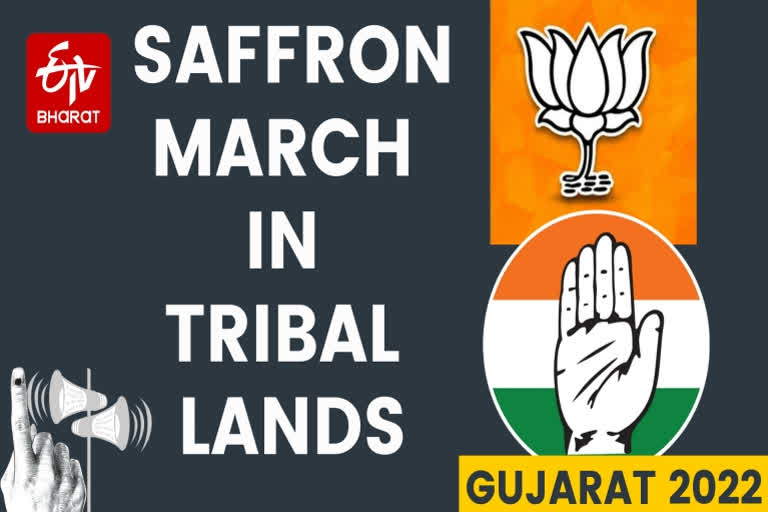Ahmedabad (Gujarat): On October 20, when Prime Minister Narendra Modi paid a visit to the Tapi district and launched construction projects worth Rs. 2,192 crores for the development of tribal regions, it was evidently a palpable effort to saffronize the traditional Congress tribal vote-bank.
Though in the last three elections, BJP made a considerable dent in the so-called dedicated Congress vote bank, it goes without saying that in a state where more than 15 percent of the people belong to Scheduled Caste and Scheduled Tribe, the saffron brigade needs to consolidate its roots among these backward people to have an edge in a triangular fight in the forthcoming elections.
From a layman’s parlance, the tribal votes bear significance because Gujarat has the fifth-highest Scheduled Tribes (ST) population in terms of absolute numbers in India. Nearly one-seventh of the state population is Adivasi, mainly concentrated in the eastern districts of the state bordering Rajasthan and Maharashtra. A dozen major tribes, among them Bhil, constitute half of the total ST share in the state.
Not only that, though there are only 27 reserved ST seats in the state there are many seats where the tribal and backward classes determine the fate of the candidates. There are 47 assembly seats in Gujarat where the ST population is more than 10 percent. In 40 assembly seats, there is more than 20 percent ST concentration. Thirty-one assembly seats, on the other hand, have more than 30 percent ST population.
Also read: Entry of AAP might be a problem for Congress in Central Gujarat
Though the tribal vote bank was considered to be a monopoly for Congress after 1990 BJP started to make a dent into it. Congress received around 60 percent of votes in the ST-reserved seats till the 1980s. This trend ended in the 1990 Assembly elections when Congress share was reduced to 36 percent in those reserved seats in Gujarat. Congress improved its performance in 1998. But the BJP has been in power since then. What is interesting, however, is that despite being out of power for two and a half decades in Gujarat, Congress has been able to maintain its ST base in the state.
BJP, which had just a 14 percent vote share in ST-reserved seats in the 1980 assembly polls, bagged 52 percent votes in 2019. In 2017 also when the BJP faced strong anti-incumbency and its seat tally first came down to double digits since the 1990 Assembly elections, the party improved its support by five percent in these reserved seats in comparison to the 2012 Assembly election.
Despite the growth in vote share in ST reserved constituencies, the BJP is still behind Congress in terms of seat share. In the last three Assembly elections (2007, 2012, and 2017), Congress won more seats than the BJP in the reserved seats. In the 2007 assembly elections, the BJP won 13 seats and the Congress 14 seats. In the 2012 elections, BJP got 11 seats and Congress got 16 seats. In the 2017 elections, 13 seats were won by BJP and 14 seats by Congress.
Also read: Gujarat polls: Saurashtra region holds key to Government formation in 2022 elections
Even though statistics might sometimes be misleading, one thing is certain tribal vote has been a key factor for all the political parties in the election fray. All three parties – Congress, BJP, and AAP have been campaigning vigorously to consolidate the tribal vote bank.
When Congress visited Dahod and declared a Satyagraha to defend the indigenous people and Arvind Kejriwal conducted an Adivasi Sankalp Mahasammelan at the Chanderia village in Bharuch, BJP was not behind. They have not only observed World Tribal Day in August but have put their ambitious Par Tapi Narmada Link Project on hold, apprehending that it might go against some tribal communities.
Speaking to ETV Bharat political analyst Pala Varu said, “Tribal society is significant for all political parties. Therefore, all political parties campaign to appease them. When Prime Minister Narendra Modi is propagating his schemes for tribal welfare, Arvind Kejriwal is promising benefits to them”.
“Aam Aadmi Party is campaigning aggressively in South Gujarat tribal areas. Congress is also promoting the idea to save tribal society. Naturally, it is evident that the tribal belt is crucial to all three parties for this reason,” Varu added.
Also read: Gujarat Assembly Elections: Battle over young voters



